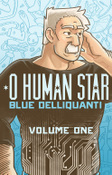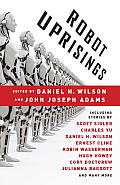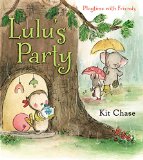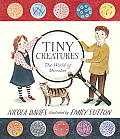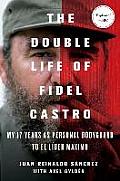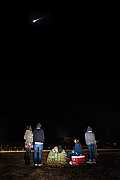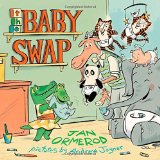Link to this review in the form of a comic strip by geneambaum tagged science fiction • graphic novel • coming of age
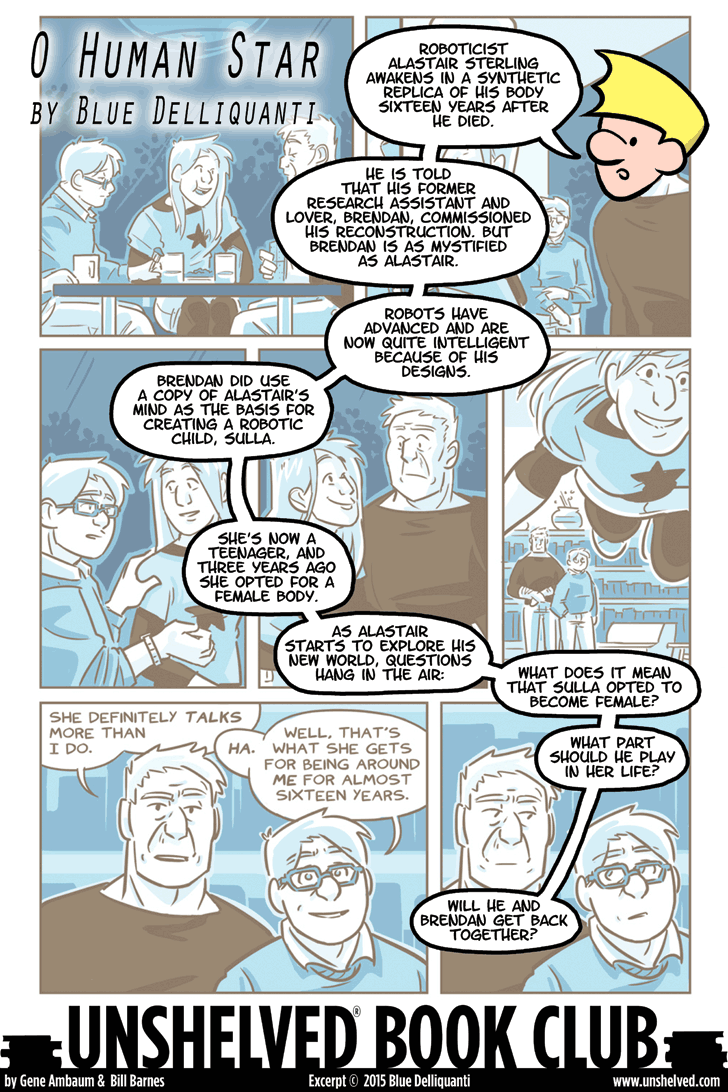
Click for the full-sized comic
Contains Chapters 1 - 3 of material originally published online at ohumanstar.com.
Link to this review by robert tagged science fiction • short stories
Cory Doctorow, Charles Yu, Julianna Baggott and science fiction great Alan Dean Foster are among the contributors to this anthology of stories about rebelling robots. A sizable fraction of them feature the smallest of robots, including the lead story “Complex God” by Scott Sigler, in which tiny radiophages take time during their cleanup of a nuked Detroit to found a religion, and Ian McDonald’s tribute to Isaac Asimov’s Fantastic Voyage, “Nanonauts! In Battle with Tiny Death-Subs!” Another sizable chunk shows how using automatons to tend to domestic and childcare duties can turn out badly, including my favorite in the collection, the haunting “We Are All Misfit Toys in the Aftermath of the Velveteen War” by Seanan McGuire. In it, misguided childcare robots make off with their charges and try to keep them kids forever.
Why I picked it up: I’d recently read a biography of Frankenstein author Mary Shelley, and I wanted to read some more recent fiction about the conflict between humanity and its creations.
Why I finished it: The stylistic range of the seventeen stories, from hard science fiction to post-apocalyptic tales in which networked mechanical marvels substitute for the zombie peril, kept me turning pages. Each story was a delightful (if usually grim) gem by a talented writer. Another one I loved was “Eighty Miles an Hour All the Way to Paradise” by Genevieve Valentine, about scattered human survivors of the robopocalypse who avoid security cameras — if they’re spotted, nearby cars will try to kill them, or the house they’re in will explode.
Readalikes: If you’d like to read an older robot uprising story, try the play which introduced the word “robot” into English, R.U.R. by Karl Capek. As you’d expect from a 1920s author in tune with issues of political economy, productive robots achieve ubiquity due to their utility and then set literary precedent by rebelling against their human masters.
Link to this review by geneambaum tagged picture book
It’s raining. Lulu (a bird) invites her friends Charlie (a rabbit) and Oliver (a tiny elephant) over for a party, but the hot chocolate she makes is terrible.
Why I picked it up: Chase’s drawings have a very soft quality. The rainy cover, where details and colors look a little blurred, is just like the view from my window in Seattle most days.
Why I finished it: My daughter is a bit of a perfectionist. When something goes wrong, it can devastate her emotionally, and she tends to give up. I loved that Charlie and Oliver pitch in to try to help Lulu make the perfect treat — the unexpected doesn’t always lead to unhappiness.
Readalikes: Little Pea, which shows that things that make some kids unhappy, like spinach, might make other kids happy.
Link to this review by sarahhunt tagged picture book • science
Even though they are so small you can’t see them, microbes are all around us. They can start a snowflake, make yogurt, or turn food into compost and come in all sorts of sizes and shapes. Some are hundreds of times bigger than others.
Why I picked it up: I love Davies’ more raucous books on animals, Deadly! The Truth About the Most Dangerous Creatures on Earth and Just The Right Size: Why Big Animals Are Big and Little Animals Are Little.
Why I finished it: The story and artwork are gentle, absorbing, and detailed in a way that would make this a great bedtime story to read again and again. When I finished it I felt lucky to live in a world with so many amazing microbes.
Readalikes: It’s the perfect follow up to Richard Scarry’s Busytown books, which show readers how the visible world functions day to day by adding the workings of the invisible world.
Link to this review by flemtastic tagged biography • history
Juan Reinaldo Sanchez was Fidel Castro’s personal bodyguard for seventeen years, but that only tells part of the story. He was Castro’s advance man who traveled ahead to other countries to secure his destinations, and also the guard in the room when Castro met with other world leaders and revolutionaries. Sanchez has met all of Castro’s children, wives, and mistresses, stayed repeatedly on Fidel’s private island, and often fished with him on his personal yacht. (Despite Castro’s protestations about being paid a meager salary and having few personal possessions, he has over twenty houses reserved for his personal use plus an island and a luxury yacht.) Castro benefited from and personally oversaw the export of terrorism, weapons sales, drug trafficking, and the bootlegging of products like whiskey and Levi’s jeans, all in Sanchez’s presence. He documents how Cuba was behind every revolution in South America in the last fifty years, as well as the one in Angola during which over 300,000 Cubans helped communist rebels win their war. Juan Reinaldo Sanchez lived in the U.S. after escaping from Cuba. He died in Miami two weeks after this book was published.
Why I picked it up: It seems like revolutions always break down, and their leaders become the thing they railed against. I wanted the dirty details of Castro’s hypocrisy.
Why I finished it: I loved the quirky little details, like that Castro always carried a complete basketball outfit in the trunk of his Mercedes so that he could be ready to play at a moment’s notice. Castro was very competitive, and there were multiple times that an entire boat full of people had to stay on the water until Fidel caught the biggest fish (or more fish) during an outing. Plus it provides insight into what Castro thought about other world leaders. (Castro thought Libya’s Gaddhafi was a basket case.)
It’s perfect for: My childhood friend Ramon. He was a teenage Cuban refugee my family met through our church who stayed with us for a year before he moved to Miami. I am sure that he would laugh about the well-known fact that Castro was a bovine genetics fanatic who went as far as stabling cows on the top of a building (they were carried there by winches) so he could perform breeding experiments. Each member of Castro’s family had their own cow; after they were milked, the bottles were delivered to Castro’s table with each child’s (as well as Castro’s) name taped to his or her bottle, so they wouldn’t be mixed up.
Link to this review by diane tagged coming of age • science fiction
What would you do if you were told that an asteroid would hit the earth and destroy two-thirds of all life on the planet? Would you continue on with your normal routine? Would you try to complete all the things on your bucket list? How would your life change?
Four high school friends (an athlete, a slut, a slacker, and an overachiever) have different answers about how they will spend what is likely their last sixty days. Chapters alternate between them. As the end draws closer, the world around them changes and, in some cases, so do their personal philosophies and beliefs. Some seek the meaning of life and whether an afterlife exists, while others want to get laid or stoned. In the end, they just decide to throw one big party!
Why I picked it up: I found it on the book table at a local warehouse store. The almost completely black cover made me look more closely at the title’s tiny print and what it was about.
Why I finished it: The characters are real and endearing. Although they start out as stereotypes, they evolve into fully realized young people and I couldn’t wait to see how things turned out for each of them. Plus, what would I do in their situation? Would my teen-self react the same way as my adult-self? The Seattle setting was also a big draw because of the references to local places and culture. And it’s Wallach’s first novel, which for me is always a plus — I love to hear from new voices.
Bonus: Wallach is a singer songwriter and he has released a companion album filled with songs related to the book available for streaming at his website.
It’s perfect for: My friend and colleague, Bre, who shares my love for edgy and unusual YA fiction, and who teaches Sociology & Psychology to high school seniors. We’re always looking for ways to connect YA lit to class content. This one could make for some very interesting discussions.
Link to this review by geneambaum tagged picture book
Mama Crocodile goes on and on about her new baby boy. His older sister, Caroline, is very jealous. When Mama takes them to the Hat Shop to swap her hat (it’s not exactly what she wants), Caroline takes her brother to The Baby Shop to do the same thing. She tries out several different babies, but none of them works out as well as she hopes.
Why I picked it up: The animals on the front cover are not only highly expressive and beautifully drawn, they’re colored with slight imperfections that make it look super kid-friendly.
Why I finished it: It was funny throughout. Mama Crocodile’s compliments for her new baby were hilarious:
”He is as green as a grub, and his eyes are as yellow as egg yolks.”
and
“He has such scaly skin and sharp little claws…”
And when Caroline takes a baby panda out for a snack, he doesn’t want a fish or a frog. He eats the bamboo chair he’s sitting on instead.
Readalikes: The details in the drawings of the street, like a llama checking its smart phone, an anteater waiting tables, and cats baking cakes, reminded me of the fun of just ignoring the story and looking at the pictures in Richard Scarry’s Busy, Busy World. (I’ve still got my tattered copy here on the shelf.)
